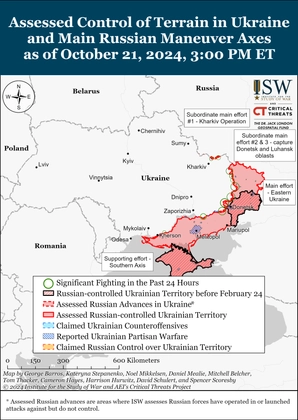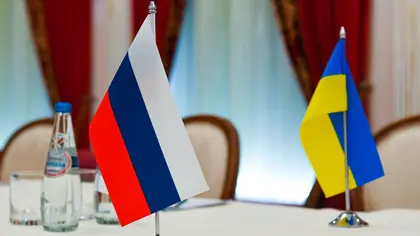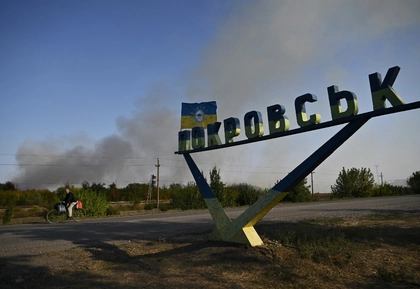European activists are reportedly planning massive demonstrations on Feb 15, 2023, almost 20 years after the largest demonstrations in European history brought millions to the streets to protest against a possible U.S. invasion of Iraq. Activists will not be protesting against Russia’s invasion of Ukraine, but rather demanding a ceasefire that would buttress Russia’s shaky hold on captured Ukrainian territory, and allow battered Russian forces to regroup.
Russian President Vladimir Putin has decreed that no negotiations to end his war against Ukraine can take place without prior agreement to Russia’s demands. These include, as a minimum, retaining control of parts of Ukraine that have been seized and annexed.
Negotiations between Ukraine and Russia would thus mean acquiescence to the dismemberment of a sovereign state, and to changing internationally recognized borders by military aggression.
Ukrainian citizens are overwhelmingly opposed to negotiations, and on Oct. 22, President Volodymyr Zelensky signed a decree rejecting direct talks.
Suggestion that Ukraine is somehow responsible for Russia’s bloodshed
Nonetheless, the Ukrainian government and civil society continue to be subjected to demands from wide-ranging sources to end the conflict by negotiating with Russia. Embedded in these demands is the implication that, by refusing to accept Russia’s domination over occupied parts of Ukraine (more than 15 percent of its land), it is Ukraine, and Ukraine’s supporters in the democratic West that are responsible for continuing bloodshed, destruction and global economic disruption.

ISW Russian Offensive Campaign Assessment, October, 22, 2024
According to news outlet Meduza, which monitors Russian government sources, Vladimir Putin himself raised the topic of negotiations…in mid-September, saying: “We’re going to do everything to ensure this ends as quickly as possible. Unfortunately, only the opposing side, the Ukrainian leadership, has declared its refusal to negotiate, has declared that it wants to achieve its goals by military means, as they say, on the battlefield.”
When Zelensky proposed a “Ukrainian peace formula” to the G20 summit in Bali, Indonesia on Nov. 15, the Russian military responded with artillery fire that cut off heat, water and electricity for millions of Ukrainian citizens. A Russian official said the barrage was punishment for “the unwillingness of the Ukrainian side to solve the problem, to enter into negotiations…”
According to the Berlin-based German Institute for International and Security Affairs (Stiftung Wissenschaft und Politik), Russia’s conditions for ending the war were tantamount to total capitulation and dissolution of the Ukrainian state – that Ukraine must lay down its arms, renounce any intention to join NATO, accept a status of permanent neutrality, grant the Russian language official status, recognize Crimea as Russian and the so-called people’s republics of Donetsk and Luhansk as independent, and “de-Nazify” and “demilitarize”. In other words, it was to undergo regime change to Moscow’s liking.
Whose interests does a negotiation with Russia really serve?
Apparently numb to these moral, political, practical obstacles, demands to negotiate reveal much about their authors’ moral principles, their priorities, and their understanding of history and political reality.
Many calls for Ukraine to negotiate with Russia have overtly economic motivations. Business and political leaders of European states, whose economies have thrived on, and become dependent on Russian energy imports, want this war resolved so sanctions against Russia will not further threaten Western European economies and lifestyles.
In August, a group of German Social Democratic parliamentarians, including members of the European Parliament, clearly suggested that Ukraine’s self-defense efforts were part of a syndrome in which Ukraine and Russia were morally equivalent. “The escalation spiral must be stopped,” the letter reads, and it called for a “modus vivendi.” Former German Chancellor Gerhard Schroeder, after meeting Putin, told the Stern weekly magazine that “the good news is that the Kremlin wants a negotiated solution.”
On Twitter, observers joked that Schroeder had been in Moscow to “pick up his paycheck.” To her credit, German Foreign Minister Annalena Baerbock said: “We hear many careless statements, like 'it’s not necessary to have absolute territorial integrity, we need to negotiate, we need to go for compromise so that finally we can have peace again.’”
But over the course of the war, many have expressed exasperation about German suggestions that Ukraine should accommodate Russian demands in view of an inevitable Russian victory – suggestions that do not seen to have been tempered by Ukrainian battlefield successes.
Negotiations have also been seen as key to maintaining political cooperation between Western states and Putin’s regime, and a stable European-Russian “security architecture.”
In May and again in June, French President Emanual Macron famously warned against “humiliating” Russia. Macron said he was “convinced that it is France's role to be a mediating power,” a role that could not be realized without a willingness on the part of Ukraine’s leaders to negotiate, which means in plain language to accept the partition of their territory – hardly a recipe for regional security.
The U.S. has supplied substantial military, humanitarian and economic assistance to Ukraine (although not in proportion to other supporters like the Baltic states), and President Joe Biden has not embraced suggestions from within both U.S. political parties to negotiate an end to the war behind Zelensky’s back, and to stay clear of the conflict.
According to former State Department official Eliot Cohen, the Chairman of the Joint Chiefs of Staff Mark Milley “created alarm among Ukraine’s friends by suggesting in several forums that Ukraine has fought Russian forces to a ‘standstill,’ and that – given the emerging stalemate on the ground and the onset of winter – the time may be ripe for negotiations between Kyiv and Moscow,” which suggested “a lack of strategic patience and staying power that only encourages Russia.”
Various actors in civil society have made the most strident and ideological calls for Ukraine to negotiate with Russia. Even in the run up to the invasion, many “peace activists,” like those comprising the U.K.-based “Stop that War Coalition,” adopted Russian propaganda narratives “in arguing against war, without engaging with the problem of Russia’s massive preparation for a military assault on Ukraine; its recent illegal annexation and subversion of parts of the country; its transparently degrading approach to the Ukrainian people’s dignity and right to self-determination; and its overt threats of war if its demands are not met.” Activists blamed the weapons industry and NATO for a “rush to war,” ignoring the fact that Russia has violently assaulted and partially occupied Ukraine since 2014.
Today, pacifist politicians, anti-war movements, and non-governmental organizations claim that sending weapons to Ukraine, and “warmongering discourse” in the West, are what is perpetuating the war. Russian leaders lobby Western governments to pressure Ukraine to negotiate, and perhaps, as the Soviet Union did in the Cold War, manipulate peace groups.
An inch would easily become a mile
Any ceasefire brought about by negotiations on Russia’s terms would not end Russia’s war against Ukraine, and amount to appeasement that would only encourage further aggression.
There can be no confusion about Russia’s motivations and intentions given clear statements by Putin that Russia aims to “take back” what it believes is Russia’s; that Ukrainian sovereignty does not exist.
Any failure to defend a democratic country attacked and illegally occupied by an aggressor is contributing to the expansion of dictatorial and totalitarian regimes around the world; and weakening the defense of human rights, in principle and practice. While we are witnessing a dangerous corrosion of respect for the right of an aggressed country to self-defense, we can all do our part to end the horrific violence in Ukraine by validating that right, and reinforcing it with our moral, humanitarian, political and military support.
Aaron Rhodes is a Senior Fellow in the Common Sense Society, and president of the Forum for Religious Freedom- Europe. He was Executive Director of the International Helsinki Federation for Human Rights 1993-2007.
The views expressed are the author’s and not necessarily of Kyiv Post.
You can also highlight the text and press Ctrl + Enter






